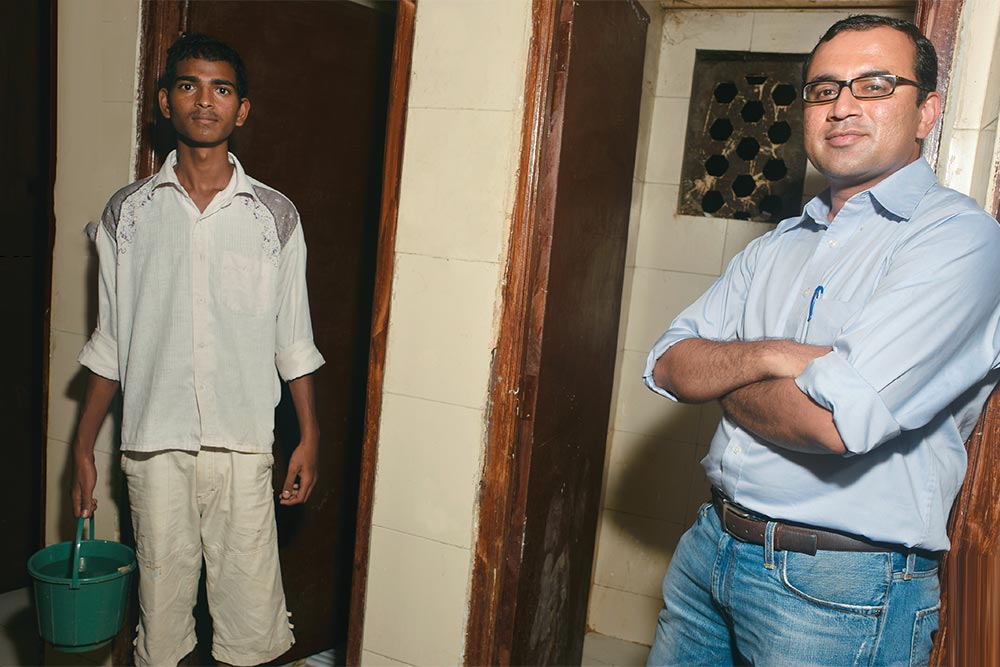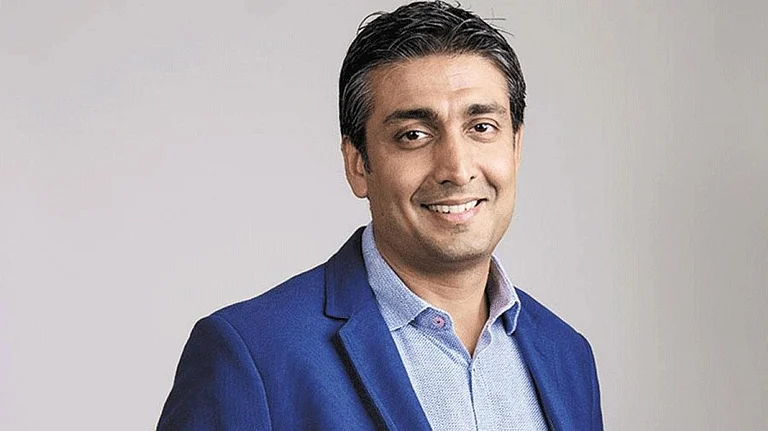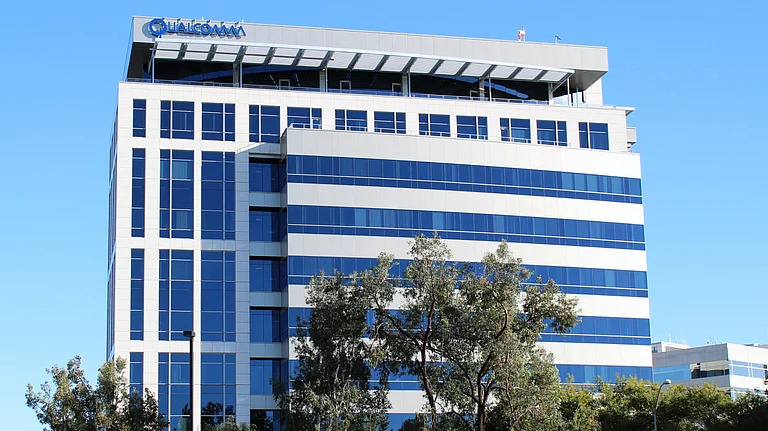His card says he’s the CTC of Samagra. New designations are sprouting all over the place these days and seeing you struggle to figure this one out, Swapnil Chaturvedi helps you out. “It stands for Chief Toilet Cleaner,” he says in all seriousness. It’s not precisely what he does, but since his startup manages public toilets in Pune, the designation does convey the business Samagra is in. “I want that there should be a sense of dignity attached to this job,” the 36-year-old adds.
Indeed, Chaturvedi is, dare we say it, quite passionate about poop. The engineer who spent a decade in the US, returned to India just to try and improve sanitation facilities in the country, especially for the urban poor. Here’s why: almost 626 million of the 1.2 billion population do not have access to toilets and have to defecate in the open. Add to this a serious lack of awareness and the consequences to health and hygiene are enormous and “any improvement here, however basic, can change the lives of people,” Chaturvedi says.
Ask 33-year-old Hiralal. He moved from Rajasthan to the Ramnagar slum in Pune’s Warje area 12 years ago and now runs a small clothes store. His wife and three daughters used the public toilet near their home with great reluctance. “It was very difficult to even enter the place. It was dark, extremely dirty and they would fall ill frequently,” he says. Now, he pays ₹50 per month for using the same Samagra-managed public toilet — twice the fee charged by the Pune Municipal Corporation, which was in charge earlier — but says the price is worth it. “It’s more dignified and far cleaner,” says Hiralal. In Kothrud, Vishwakarma, a self-employed carpenter with an eight-member household, voices a similar sense of relief. “Now we can use the toilet, which is just five minutes away from our home. Earlier, we used to avoid it because it was so filthy,” he says.
Feedback like this is some reward for the work Chaturvedi has put in. On a visit to his parents in Bhilai in 2007, he was appalled to see how migrants in the city lived. Looking back, Chaturvedi believes the new consciousness of the pathetic conditions, especially for children, had something to do with the fact that he was a new father himself. The following year, he quit his job in the US and enrolled for a program in design at Northwestern University, where he decided to specialise in sustainable urban design with a focus on sanitation.
Getting Started
In August 2010, Chaturvedi returned to India with his wife and young daughter and a year later, set up Samagra (Sanskrit for holistic), investing ₹20 lakh from his own savings in the venture. He also received a $100,000 grant from the Bill and Melinda Gates Foundation. “Our two-page application focused on making toilets affordable, accessible and aspirational in addition to creating a sustainable business out of this,” he says.
Alyse Schrecongost, Samagra’s associate program officer at the Bill & Melinda Gates Foundation, believes the enterprise’s model is unique since its success is linked to the urban poor having access to better quality sanitation services at an affordable cost. “The company is committed to reaching users of public toilet blocks at scale equally for business and social motivations,” she points out.
Samagra now manages four public toilets in Pune, which account for 130 toilet seats and are used by over 3,300 people every day. But that’s not what the business’s original plan was. The company started off in Bhubaneswar as a poop-to-power project. The idea was to convert human waste into carbon-neutral electricity and organic fertilisers. The electricity was stored in batteries used by street vendors to light their stalls. But the idea didn’t really take off — not progressing beyond two toilets, 50 users and 15 battery customers — because of multiple challenges.
There were no buyers for the fertiliser as human waste is considered taboo; it was difficult getting workers for the processing facility; and scaling up was a problem because of high urban land prices. “We realised waste to power would work only if the technology is on-ground without the need for transport. So, the new business model was a rewards programme that didn’t rely on monetising waste,” says Chaturvedi.
By April 2012, Samagra had decided to focus on encouraging poor people to use public toilets and decided to move to Pune on a friend’s recommendation, taking over the management of a toilet each in Kothrud and Warje. Pune has 2,150 blocks with 16,891 seats, and 300 more are added each year. But, as Umesh Mali, assistant commissioner, Pune Municipal Corporation (Warje and Karve Nagar ward), points out, “There is no sense of ownership. People view the toilets as public property and, in the process, hygiene suffers.”
Nirat Bhatnagar, founder and CEO of Wash for India, a nonprofit social innovation venture that develops solutions to address sanitation problems, agrees. “In rural India, there is very little access to toilets. Once these people migrate to urban India, they are not educated on the utility of toilet,” he says. Against United Nations’ guidelines of a maximum 50 users per toilet seat, India has many times that number. “A toilet should use at least 30 litres of water every day per person. Caretakers are not paid well and it is clear that we have a serious problem,” Bhatnagar adds. A business case in toilets, then, needs to consider all these issues very carefully.
Making poop pay
The trick lies in making people pay the right price for using the facilities — too little and there will be no ownership; too much, and no one will pay. As a starting point, Samagra analysed the pricing followed by Sulabh International — the largest non-profit organisation in India, which manages over 8,000 toilet blocks across India. At ₹2 a head per use, on average a family of five will pay at least ₹300 a month for using a Sulabh facility. Chaturvedi worked backward from that figure. “We decided to charge a monthly membership fee of ₹50-60 per family for unlimited usage,” he says. While electricity is provided free of cost from 7 pm to 6 am by the municipality, the plan is to get connections in Samagra’s name, which will add ₹600-700 to the monthly cost but will ensure electricity during the day as well for light and ventilation. Water is also free, while Samagra pays the caretaker (₹8,000 per month) and cleaner (about ₹2,000 a month).
Samagra’s revenue is, therefore, directly linked to the number of people who sign up to use the loos — some 980 families have already signed up, but not all users are in a position to pay regularly or at all. Currently, revenue across the three blocks is about ₹40,000 per month, of which about ₹30,000 goes towards maintenance; the business is breaking even on an operating level. Going ahead, the plan is to have 25 blocks under operation, eight more blocks by the year-end and the rest by mid-CY14. Given that there are 30 toilet seats in each block, that means 750 seats. Considering an average of 30 users per seat per day, the number of total users will be 22,500. “The critical mass in this business is to get to 5,000 families, which should happen by March 2014. That is when the business starts to get very attractive since the fixed costs are recovered quite easily by then,” explains Chaturvedi.
Samagra is also looking at other ways to make the business profitable. The caretakers have been provided with basic tablet computers, priced at ₹7,000, which contain all details of the user — name, age, profession, address, family members, among other things. “The user just needs to remember his identification number when he wants to use the toilet,” points out Chaturvedi. Users are “rewarded” for using the toilet and maintaining hygiene — points are awarded against the identification number each time they use the toilet or when they make their payment on time. For instance, 50 points are awarded if the user washes his hands while a payment at the start of the month earns 500 points.
The Loo Rewards can be redeemed at three partner stores in the neighbourhood against purchase of basic products such as soaps, detergents, biscuits and edible oil. Samagra will get a commission on each purchase, which is at least 10% of the maximum retail price. It is also hoping to interest FMCG companies in the consumption data. “There is very little data on the bottom of the pyramid and that is something we can provide to large companies,” he says.
For now, Samagra needs to increase the user base without compromising on the user experience. Equally importantly, Chaturvedi wants sanitation and human waste management to be more openly discussed and the social stigma removed from the issues. After all, as he says, “It may be poop to you, but it is my bread and butter.”











